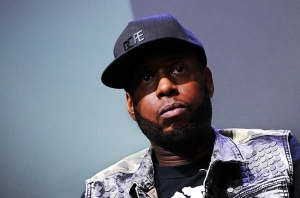U.S. musicians respond to racist shooting
American musicians joined in the condemnation of the August 9th slaying of unarmed teenager Michael Brown in Ferguson, Missouri by white police officer Darren Wilson. In a Huffington Post interview, prominent Brooklyn rapper Talib Kweli (pictured above), on the front lines in Ferguson after the killing, responded sharply to efforts by authorities to diffuse the justified anger of the town’s black community. “We’re getting killed out here in the streets,” he said. “We cannot afford to put peace above justice. We work towards peace, that’s the end goal, but it’s about organization, it’s about strategy, it’s about tactics. It’s not about calming down.” Outspoken R&B singer Lauryn Hill responded to the killing with a new song, “Black Rage”. The song takes the melody of the Rogers and Hammerstein standard “My Favorite Things” but replaces the sugar-coated lyric with a bitter satire that evokes Billie Holiday and Nina Simone. Radical singer-songwriter David Rovics also responded. “His Hands Were in the Air” is a typically hard-hitting Rovics broadside. These are only a few of the many interventions by musicians in the Michael Brown case.
Standing on the edge of a revolution?
Nickleback is one of the most successful rock bands in the world. The slick quartet from Alberta has sold more than 50 million records and raked in a slew of music industry awards, all despite receiving mostly hostile reviews from rock critics. They’ve been derided for their overuse of that most time-honored of rock themes: sex, drugs and rock & roll. While occasionally the band engages social issues (e.g. spousal abuse), they’ve steered clear of political commentary. However, in a surprising turn this summer, Nickleback released Standing on the Edge of a Revolution – a single from their upcoming new album No Fixed Address. In the video, we find the band in a dimly-lit classroom, performing before adolescent students, with a succession of protest images and slogans projected on a screen behind them. They incite the kids with references to the privileges of Wall Street banksters, domestic spying by the NSA & CIA, and images of the occupy protests. As the kids grow increasingly angry and start overturning desks and throwing paper in the air, the band leads them in a call-and-response chant for revolution. Sadly, it’s a little deflating to see the students, fists in the air, defiantly repeating that pathetically unspecific advertising slogan: “We want change!”
British musicians support BDS
While supporters of the cultural boycott of Israel failed to persuade North American rocker Neil Young to sign on this summer (he canceled his Tel Aviv concert for ‘security’ reasons), the BDS campaign continues to attract prominent musicians in Europe. On July 25th, during the IDF assault on Gaza, the U.K. Palestinian Solidarity Campaign delivered an open letter to Prime Minister David Cameron calling for an end to Britain’s arms trade with Israel. Visiting Canadian rock star Bryan Adams was among the signatories, who also included Bobby Gillespie of Primal Scream and Robert Del Naja of Massive Attack. Speaking of Massive Attack, the popular English band headlined Ireland’s Longtitude 2014 music festival earlier that month. Their spectacular evening concert displayed pro-Palestinian LED solidarity messages. On July 27th more than 50,000 people attended a Gaza solidarity march in London. Speakers included composer Brian Eno and guitarist-producer Dave Randall (of Faithless and Slovo fame). Irish singer Sinead O’Connor sent greetings and added her name to the ever-growing list of musicians who have pledged not to perform in Israel until justice for Palestine has been realized. For more info: http://refrainplayingisrael.blogspot.co.uk/.
Native rapper takes on sports mascots
Sports fans are often attached to the symbols associated with their favorite team, but too often they are oblivious to the racist implications of those symbols. In recent years, Native Americans have stepped up their fight to compel offending teams (e.g. Cleveland Indians, Atlanta Braves, Chicago Black Hawks) to acknowledge the pain that abuse of their identity as sports mascots has caused. At the centre of the controversy is the team with what may be the most egregious name: the National Football League’s Washington Redskins. The campaign picked up steam in August when CBS and NBC sports broadcasters Phil Simms and Tony Dungee declared that they will no longer use the word “Redskins” on the air. On September 2nd the sports network ESPN dedicated an episode of its show “Outside the Lines” to the controversy. It opened with a performance by the popular 25-year-old Native American rap star Frank Waln (from the Rosebud Sioux reservation in South Dakota) and his band Nake Nukla Waun (“I am always ready, at all times, for anything”). A podcast can be accessed at the ESPN website. For info about Frank Waln check out an interview with him at www.peoplesworld.org and look for his outstanding video “Hear My Cry” on YouTube.
